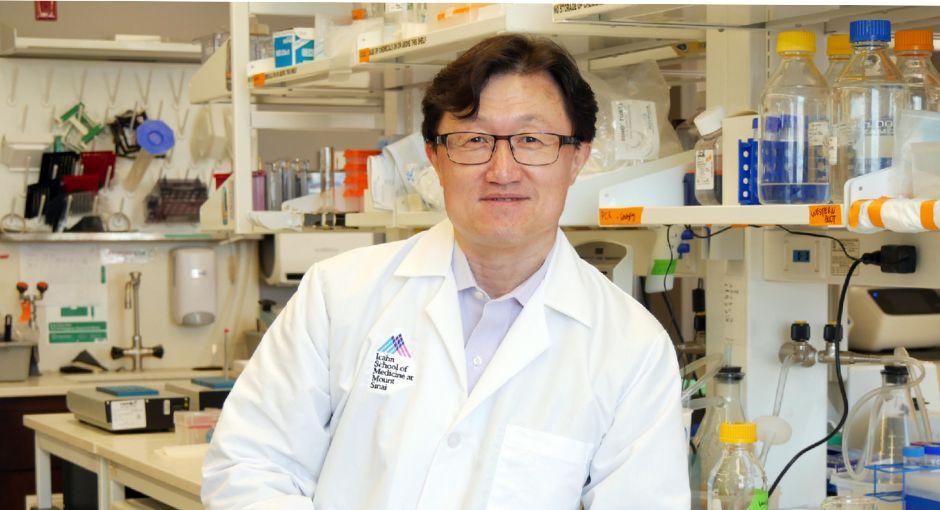New Parkinson’s Foundation Research Center Explores Dopamine Nerve Cell Diversity

The Icahn School of Medicine at Mount Sinai in New York is the newest Parkinson’s Foundation Research Center. Center Director Zhenyu Yue, PhD, and his research team are investigating the diversity of dopamine nerve cells in the brain and their vulnerability in Parkinson’s disease (PD). Better understanding how different groups of dopamine neurons work, could get us closer to designing more effective therapeutic strategies.
Parkinson’s Foundation Research Centers are medical or academic centers that have the goal of advancing the understanding and treatment of Parkinson's. Each center is currently investigating a minimum of three interconnected PD research studies.
By the time a person is diagnosed with Parkinson’s disease, more than 60% of their brain’s dopamine nerve cells (neurons) have already died. This loss continues over time. There are no medications that can preserve the existing dopamine neurons or reverse the disease.
The team of Icahn investigators recently completed a study profiling more than 300,000 cells from a specific region in the brain vulnerable in Parkinson’s. They identified different types of dopamine neurons in human brains, and found that people with PD have significantly fewer dopamine neurons and perhaps other types of neurons compared to those without PD. They have analyzed the changes of gene expression in many different cell types, including those dopamine neurons that persist through many years after the onset of movement symptoms.
With Parkinson’s Foundation funding, the team will now investigate the functions of these different types of dopamine neurons — and how they can lead to better treatments.
“It's an opportunity for us to learn how many different cells are adapted to the disease state. We are so thankful to the Parkinson’s Foundation for seeing how the potential of this work can lead to new findings.”
- Dr. Yue
Icahn scientists will do a deeper dive into the diversity of dopamine nerve cells. Being able to uncover the nuances of the different types of these nerve cells is essential for the development of new PD medications. In addition, Dr. Yue’s team is working to find what leads to the loss of dopamine neurons as PD progresses, and identify ways to help neurons survive, which can ultimately lead to better quality of life for people with PD.
Dr. Yue, who has dedicated nearly 20 years of his research career to the study of neurodegenerative diseases, says that several circumstances aligned to draw him into the field, including the diagnosis of a family member with PD.
“I thought I could do something to help people,” Dr. Yue said. His postdoctoral training opened the door to the possibilities of transgenic rodent technology — an approach that allows scientists to study human disease and explore therapies in mice. Icahn researchers will continue using this approach and new technology of single cell profiling to better understand dopamine neuron diversity.
Dr. Yue is a faculty member of the Friedman Brain Institute, under the leadership of Dr. Eric Nestler. He was recruited into the PD research field in 2004 by renowned PD doctor and researcher, C. Warren Olanow, MD (Chairman Emeritus at Mount Sinai School of Medicine’s neurology department). Dr. Olanow encouraged Dr. Yue to investigate Parkinson's. Around the same time, scientists discovered the association between mutations in the LRRK2 gene and Parkinson’s disease. Genetic mutations in the LRRK2 gene play a role in about 1% of all people with PD and 5% of those with a family history. Dr. Yue’s laboratory was among the first to develop an important LRRK2 PD model.
Today, Dr. Yue and his colleagues are studying another gene associated with the risk of Parkinson's. “We have known for a long time that dopaminergic neurons degenerate in Parkinson's disease, but we also found degeneration of a unique neuron population during our initial study,” Dr. Yue said. These neurons are enriched with RIT2 — the product of a gene mutation associated with Parkinson risk. A member of Dr. Yue’s team will explore the relationship between the RIT2 neuron population and PD.
The PD research conducted in Dr. Yue’s lab is essential to explain molecular basis for vulnerability and resilience of human dopamine neurons in PD. Research Centers further the Parkinson’s Foundation mission to advance the understanding and treatment of the disease. Centers receive $2 million each — $500,000 annually over four years — to fund innovative team science. Prestigious Parkinson’s Foundation Research Centers include:
- Icahn School of Medicine
- Columbia University Medical Center
- University of Florida in collaboration with Emory University
- University of Michigan in collaboration with The University of Texas Southwestern Medical Center
- Yale School of Medicine
Of receiving the Research Center designation, Dr. Yue said: “I feel privileged to have received this award for our Center, as it offers an amazing opportunity to work with a group of outstanding clinical and basic research scientists at Mount Sinai. This award will encourage me to think boldly and attack challenging questions in PD research through collaboration with a diverse team with complementary expertise.”
Learn more about the critical ongoing Parkinson’s Foundation research initiatives and find out how you can participate in Parkinson’s research today in our Join A Study page.
Related Blog Posts

Meet the Researcher Working to Restore Sleep in Parkinson’s

